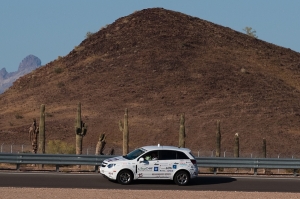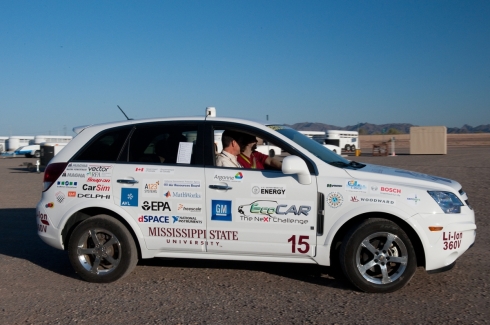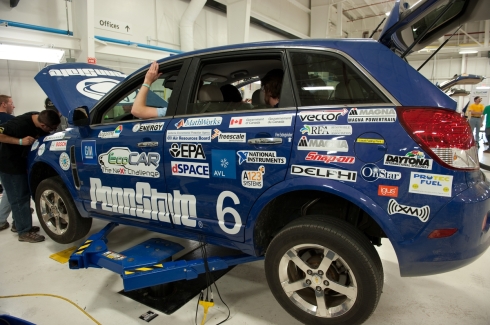You are currently browsing the tag archive for the ‘Mississippi State’ tag.
It has been a busy week at the EPA’s National Vehicle and Fuel Emissions Laboratory (NVFEL) in Ann Arbor, MI as five teams were able to complete several dyno testing sessions on both the 2WD dyno and 4WD dyno.
The Ohio State team was excited to use the 4WD chassis dyno at EPA because they only have 2WD dyno capabilities at their university.
“With the 4WD dyno, some of the major focuses of our testing have been tuning our electrically heated catalyst control and some engine transient testing on the EPA drive cycles,” said Ohio State controls team lead John Kruckenberg.
The Ohio State team was able to analyze their catalyst control in hopes of improving their emissions of cold starts and getting a better baseline for how their vehicle performs on the road.
“In the second four-hour drive cycle, we were able to complete the official EPA certification dyno test so we could compare our previous test cycles to that of our electric drive mode to see how the vehicle runs on a standard cycle.”
Other teams, like Mississippi State, decided to test their urea-injection system that reduces NOx emissions in diesel fuel. This type of testing helps determine the optimal amount of urea to inject into the system for emissions purposes.
“You must inject sufficient amounts of urea to reduce the NOx emissions to a suitable level; however, if an excessive amount of urea is injected, this will cause ammonia to accumulate in the catalyst potentially resulting in harm to the system,” said Mississippi State Faculty Advisor Marshall Molen.
The University of Waterloo was also able to complete several dyno sessions this week at EPA. Their fuel cell plug-in hybrid electric vehicle (FC-PHEV) is just one of two in this competition.
“We ran a combination of urban and highway cycles just to get a baseline for vehicle performance and to be able to data log our powertrain,” said University of Waterloo team leader Michael Giannikouris.
“We also had the opportunity to get to do custom acceleration tests that allowed us to tune certain controls parameters on the dyno.”As the Group A dyno testing came to a close, both students and advisors agreed that this workshop was really beneficial.
“It has been great to work with EPA personnel and equipment,” said Will Dickerson, team member for Mississippi State. “We are able to get a better understanding of the kind of testing procedures that are relevant to today’s emissions testing.”
This week’s Mentor Monday post features Bill Beggs, an engineering group manager at GM. Bill has been an Advanced Vehicle Technology Competition mentor for six years, first with Challenge X and now with the Mississippi State University EcoCAR team. Bill has visited MSU twice in the past year, once last fall and once prior to the Year Two competition, to offer advice and assist the students with their EREV. The team was extremely successful in Year Two and their efforts were both recognized and rewarded in San Diego with a first place win in the overall competition.

During the EcoCAR Year One fall workshop, GM mentor Bill Beggs delivers a check for seed money to the MSU team leader, Matthew Doude
“It was great seeing all the teams’ efforts at the Year Two Finals in May,” said Bill. “I’m proud of my team for winning, but it’s also inspiring to see the work of the other teams, too.”
Bill is looking forward to traveling to Mississippi later this year to check in on the team’s status in the third and final year of EcoCAR.
“It makes a huge difference when you get face time with the students,” said Bill. “I love meeting individually with everyone on the team, seeing the vehicle first hand and talking through any issues they may have. You just can’t get that kind of interaction over the phone or through email.”
In Year Three, MSU is focused on vehicle refinement, which includes improving drive quality and optimizing fuel economy. The students are also looking to incorporate after-market consumer electronic features, such as touch screens, into the console of their car.
Bill has worked for GM for 10 years. Based in the Energy Center in Milford, MI, his current project focuses on the development and execution of more efficient fuel economies.
“Basically, our goal is to achieve the best possible fuel efficiency we can for consumers,” he said. “With all the new advances in vehicle technology, it’s an exciting field to be a part of right now.”
With seven E85, six B20 biodiesel, two H2 fuel cell, and one full-electric vehicle at the Year Two Finals, the contest was fierce as each team showcased their unique vehicle architecture and competed for the first place trophy.
In the end, Mississippi State University took top honors with their plug-in series hybrid. The team won more than 15 awards during the Year Two Competition Finals, including 1st place in Energy Storage Design, 1st place in Outreach, 1st place in every Emissions and Energy Consumption event, and had the Best Controls, Mechanical, and Vehicle Design Review presentations.
In Year Two, the Mississippi team integrated a variety of components into their vehicle to decrease emissions and maintain consumer acceptability. The team’s plug-in range-extended hybrid included a well designed, translucent energy storage system cover with an inventive liquid cooling system. They had an innovative high-voltage wire routing, urea injection system, and maintained stock cargo space. They even bettered the baseline vehicle by more than two seconds in the Autocross Event.
MSU also won every dynamic event in the Emission and Energy Consumption category. For the first time in Advanced Vehicle Technology Competition history, the Mississippi team received the highest fuel consumption score. The team utilized more than 90 percent of their 21 kWh battery pack and finished both the 22 mile and 44 mile schedule without using any biodiesel. The team was also able to significantly reduce their petroleum use by charge depleting for 60 miles and bettered the baseline vehicle’s greenhouse gas score by more than 30 percent in the Well-to-Wheel Greenhouse Gases event. In the end, Mississippi State achieved Tier 2, Bin 7 emissions over the EcoCAR drive schedule and averaged less than 2 Lge/100km in fuel consumption.
Taking home second place at the Year Two Finals, Virginia Tech won a combined eight trophies including Best Electrical Presentation and Best Braking, and was the runner up in Best Petroleum Energy Usage and Best Tailpipe Emissions. The team’s E85 engine with a 15 kilowatt belted alternator and 80 kilowatt rear traction drive successfully completed every dynamic event. Virginia Tech’s vehicle stopped within mere seconds during the Braking event and won Best Static Consumer Acceptability with a clean engine compartment, five passenger seating, and a fully functional touch screen.
Penn State University placed third overall with a 1.3L, B20 biodiesel series hybrid. At the Year Two Finals, the team took home eight awards, including Best AVL Drive Quality, Best Social Media, 2nd in A123 Battery Design, 3rd in Outreach, and was the runner up in Best Fuel Consumption and Best Tailpipe Emissions. The team’s fuel consumption averaged around 4.1 Lge/100 km and the EcoCAR displayed impressive acceleration linearity and quick throttle response during the Drive Quality dynamic tests. In addition, the team was able to host more than 50 outreach events and increase media relations by more than 400 percent in the outreach program.
Although Mississippi State, Virginia Tech and Penn State were the top three teams in Year Two, there was a variety of other awards given out during Finals. You can find the complete list of winners, here.
With only one year left, the EcoCAR competition will get fierce as all 16 EcoCAR teams fight for the number one spot in Year Three. Who will it be? Check back to the Inside the Green Garage blog throughout Year Three for team and competition updates!
What is your team’s secret to winning? What kind of fuel economy did your vehicle get? What was the best part about being at the GM Desert Proving Ground in Yuma?
Check back to the Inside the Green Garage blog tomorrow at 3 p.m. ET for an opportunity to talk shop with the EcoCAR Year Two winners – Mississippi State, Virginia Tech and Penn State. Simply click below to join the chat and ask the teams your questions.
Webchat with the Top Three Universities from Year Two EcoCAR Challenge
Please join us on Friday, June 4 at 3:00 p.m. EDT for an opportunity to chat with the recently announced EcoCAR Year Two winners: Mississippi State, Virginia Tech and Penn State. During the Web chat, the teams will answer questions about their exceptional vehicles, highlights from Year Two and their strategies for Year Three of the competition! The conversation will take place right here on the Inside the Green Garage blog. No early registration is required, just come to the site and have your questions ready! Please spread the word and we’ll see you back here next Friday.
Congratulations to the first three teams to pass Safety/Tech Inspection. Mississippi State and Penn State officially passed their inspections late last night, and UOIT passed early this morning.
The UOIT team was close to passing earlier, but just kept encountering small problems that seemed to take much more time than expected to remedy. The team said they spent a lot of time wrapping wires in the correct colors of tape and making sure certain areas of the vehicle were labeled with the correct signage.
Mississippi State passed the inspection slightly before Penn State, but the teams actually worked together to solve some of their problems, including controls issues. Teams shared notes and expertise to help each other along.
“Being the first to pass Safety Inspection doesn’t mean we are ahead in the competition,” said Matt Doude, team leader for Mississippi State University. “Our biggest events are still ahead of us and there are so many awesome teams that we have to compete against. It’s going to be tough.”
All the teams have been hard at work, and teams from University of Victoria, North Carolina, and Wisconsin are in the queue for their safety inspection this afternoon.
MSU recently had the pleasure of hosting Mississippi Senator Alan Nunnelee on its campus. The senator lead a candid discussion with political science and business students, as well as members of the EcoCAR team. Nunnelee spoke about the benefits of hybrids, MSU’s participation in the EcoCAR program, and political attitudes toward hybrid adoption.
Regarding political attitudes toward hybrids, the senator talked about the benefits of hybrids in relation to the economy and environment. He also touched on some of the ramifications for the state’s budget. A current example of those ramifications is the state tax on every gas purchase that goes to the building and repair of roads in the state; if hybrids became widely adopted in the area, cars would still wear on the roads, but purchase significantly less gas. This would compel the state government to find new ways to make up for the shortage of gas revenues.
It was inspiring to hear the influential viewpoint of Senator Nunnelee and his enthusiasm about the EcoCAR program!
Time has flown by! The Mississippi State EcoCAR team is finding it hard to believe that their vehicle ships to competition in less than three weeks. The team is making serious progress, but the evidence of the progress changes every day.
On any given day in the last month, the vehicle could be assembled and driving around the team’s parking lot in the morning, and that afternoon it could be six feet off the ground – no engine, no motors, no wheels, no axles, no seats, no dash -basically a shell of a vehicle with hundreds of electrical wires exposed. The MSU team has two team members that are becoming experts at installing and removing a 1.3L diesel from their EcoCAR.
Despite minor set-backs, the team has met several goals in the last few weeks. The battery pack is installed and meets clearance, fuel, brake, coolant, and HV lines have been routed safely and to code, and additional communication has been added and validated between the Mototron and dSPACE controllers.
This past weekend, the team’s engine finally arrived and is up and running! The students made great progress with the engine and are excited to load their vehicle on the transporter and send it to Yuma!
Check out the video below for an update from the team from inside their garage!
In the video below, the Mississippi State EcoCAR team answers the question, “What is an Extended Range Electric Vehicle (EREV)?”
Team leader, Matthew Doude, shows off the team’s vehicle and explains how the EREV is powered and what happens when the battery power is depleted.
Mike Wahlstrom from Argonne National Laboratory also makes an appearance and describes how the fuel economy of each EcoCAR vehicle is calculated.
Check out the video below!
Do you agree with the Mississippi State team that EREV technology will be a reality?
Follow along with us during the EcoCAR Year Two Finals, May 17-27, 2010, to see how MSU’s EREV stands up against the other competing teams!
While most EcoCAR students are focused on engineering and looking to learn more about the automobile industry, the EcoCAR competition also offers plenty of room for non-engineers to gain valuable experience.
This semester, the Mississippi State EcoCAR teamed up with a senior level marketing management class on campus. MSU team leader, Matthew Doude, and advisor, Marshall Molen, spoke to the class about the EcoCAR competition, hybrids in general, and explained what the team has been working on in Year Two. The students were very enthusiastic and asked questions about safety, strategy, and what they could do to help the team.
After visiting the class, the marketing management students came up with ways they can contribute to the team’s efforts that are relevant to their interests and fields of study.
“I enjoyed learning about the EcoCAR team’s hybrid car and how green vehicle technology is valuable to today’s society,” said senior marketing student, Haley Sellers. “I also learned how to use different marketing skills to target and educate the public about why green is the future of transportation.”
The marketing management students have shared innovative ideas with the MSU EcoCAR team and the additional man-power has been really helpful. It was a pleasure watching the two groups of students learn from each other through the process!










